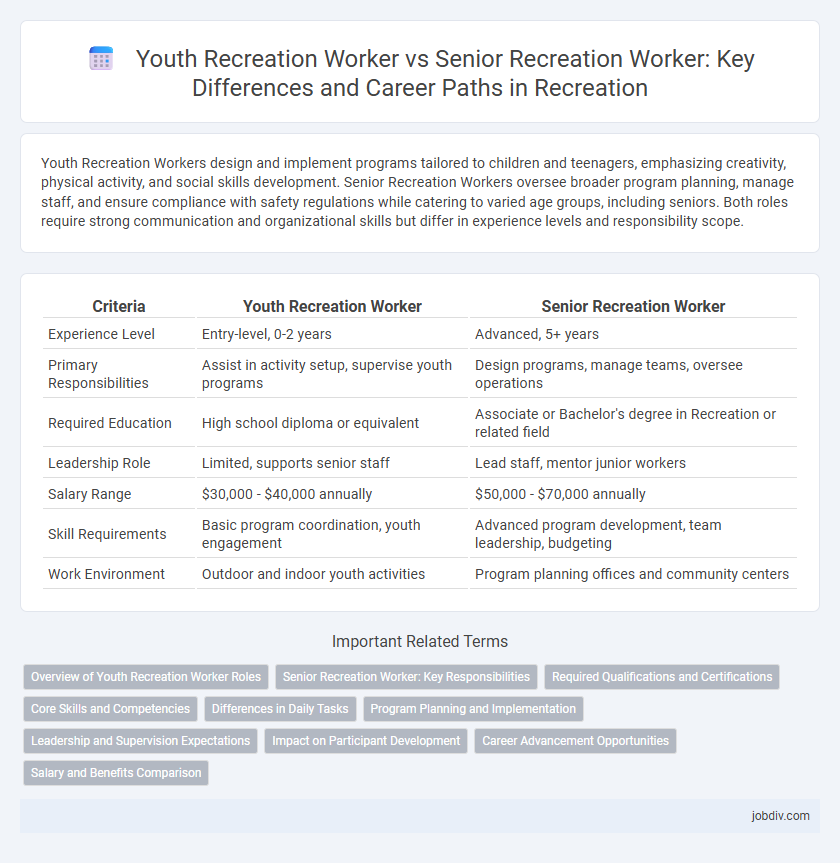Youth Recreation Workers design and implement programs tailored to children and teenagers, emphasizing creativity, physical activity, and social skills development. Senior Recreation Workers oversee broader program planning, manage staff, and ensure compliance with safety regulations while catering to varied age groups, including seniors. Both roles require strong communication and organizational skills but differ in experience levels and responsibility scope.
Table of Comparison
| Criteria | Youth Recreation Worker | Senior Recreation Worker |
|---|---|---|
| Experience Level | Entry-level, 0-2 years | Advanced, 5+ years |
| Primary Responsibilities | Assist in activity setup, supervise youth programs | Design programs, manage teams, oversee operations |
| Required Education | High school diploma or equivalent | Associate or Bachelor's degree in Recreation or related field |
| Leadership Role | Limited, supports senior staff | Lead staff, mentor junior workers |
| Salary Range | $30,000 - $40,000 annually | $50,000 - $70,000 annually |
| Skill Requirements | Basic program coordination, youth engagement | Advanced program development, team leadership, budgeting |
| Work Environment | Outdoor and indoor youth activities | Program planning offices and community centers |
Overview of Youth Recreation Worker Roles
Youth Recreation Workers design and implement engaging activities tailored to children and teenagers, fostering social development and physical health. They coordinate programs in community centers, schools, and camps, ensuring safe, inclusive environments that promote youth participation. These workers require strong communication skills, creativity, and knowledge of age-appropriate recreational methods to support positive growth and community involvement.
Senior Recreation Worker: Key Responsibilities
Senior Recreation Workers lead and coordinate youth and community programs, ensuring engagement and safety while managing staff and resources efficiently. They develop innovative recreational activities tailored to diverse age groups and cultural backgrounds, enhancing social inclusion and physical well-being. These professionals also evaluate program outcomes, prepare detailed reports, and maintain compliance with municipal regulations and health standards.
Required Qualifications and Certifications
Youth Recreation Workers typically require a high school diploma combined with certifications in First Aid, CPR, and child development courses to effectively engage with young populations. Senior Recreation Workers often need post-secondary education in recreation, leisure studies, or a related field, alongside advanced certifications such as leadership training, risk management, and specialized program development credentials. Both roles emphasize the importance of ongoing professional development and experience in community programming to ensure safe and enriching recreational activities.
Core Skills and Competencies
Youth Recreation Workers excel in interpersonal communication, activity planning, and conflict resolution tailored to youth engagement, emphasizing creativity and adaptability in dynamic environments. Senior Recreation Workers demonstrate advanced leadership, program management, and staff supervision skills, coupled with strategic planning and evaluation expertise to enhance recreational service delivery. Both roles require strong teamwork, safety awareness, and community outreach capabilities to foster inclusive and enriching recreational experiences.
Differences in Daily Tasks
Youth Recreation Workers focus on organizing and supervising activities tailored to children and teenagers, such as sports, arts, and educational programs, ensuring a safe and engaging environment. Senior Recreation Workers manage broader responsibilities that include supervising staff, developing comprehensive recreation plans, and coordinating community events across various age groups. The senior role emphasizes leadership and program development, while the youth worker role centers on direct interaction and activity facilitation with young participants.
Program Planning and Implementation
Youth Recreation Workers primarily assist in developing and facilitating age-appropriate activities, focusing on engaging younger participants through creative play and skill-building programs. Senior Recreation Workers lead comprehensive program planning and implementation, overseeing multiple activities, managing staff, and ensuring alignment with community needs and organizational goals. Expertise in scheduling, resource allocation, and evaluation metrics distinguishes Senior Recreation Workers in delivering effective, scalable recreation services.
Leadership and Supervision Expectations
Youth Recreation Workers are responsible for guiding and supporting young participants through programmed activities, exhibiting leadership by fostering a safe, inclusive, and engaging environment while assisting in day-to-day supervision. Senior Recreation Workers hold advanced responsibilities including planning, coordinating, and supervising multiple programs, providing leadership to Youth Recreation Workers, and ensuring adherence to organizational standards and community needs. Senior roles emphasize mentorship, conflict resolution, and performance evaluation to enhance team effectiveness and program quality in youth recreation services.
Impact on Participant Development
Youth Recreation Workers foster foundational social skills and physical activity habits among young participants, enhancing confidence and teamwork through age-appropriate programs. Senior Recreation Workers design and implement advanced, inclusive activities that promote leadership, resilience, and lifelong wellness skills in diverse participant groups. Both roles significantly contribute to participant development by tailoring engagement strategies to the evolving needs of youth and adults.
Career Advancement Opportunities
Youth Recreation Workers gain foundational experience in program planning and community engagement, positioning them for promotion to Senior Recreation Worker roles. Senior Recreation Workers take on greater responsibilities, such as leading specialized activities and mentoring junior staff, which advances their leadership skills and career trajectory. Opportunities for career advancement include supervisory positions, program management, and specialization in fields like therapeutic recreation or sports administration.
Salary and Benefits Comparison
Youth Recreation Workers typically earn a median salary ranging from $30,000 to $40,000 annually, with benefits that often include basic health insurance and paid time off. Senior Recreation Workers receive higher compensation, averaging between $45,000 and $60,000 per year, coupled with enhanced benefits such as comprehensive health coverage, retirement plans, and professional development opportunities. Salary and benefits for Senior Recreation Workers reflect their greater responsibility and experience in program planning and leadership compared to Youth Recreation Workers.
Youth Recreation Worker vs Senior Recreation Worker Infographic

 jobdiv.com
jobdiv.com